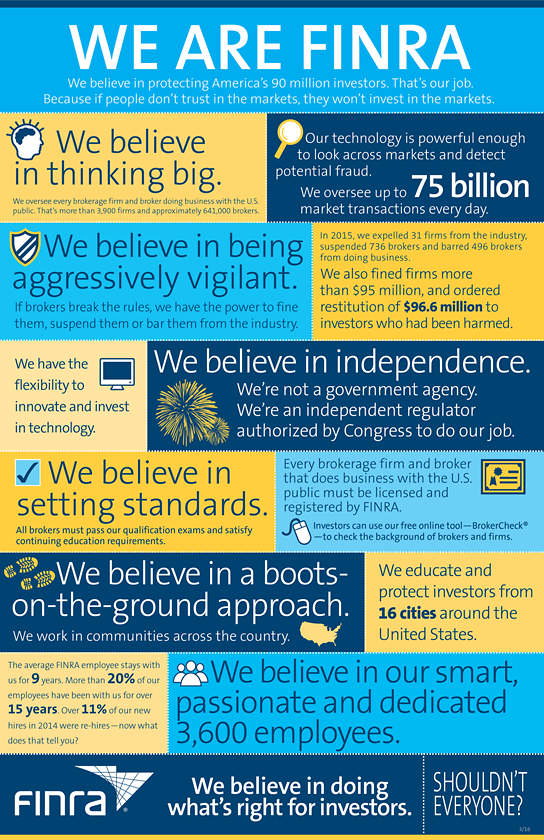FINRA, or the Financial Industry Regulatory Authority, plays a crucial role in maintaining the integrity of the U.S. financial markets. As the largest independent regulator for securities firms operating in the United States, FINRA is dedicated to protecting investors and ensuring market fairness. In an era where financial transactions are becoming increasingly complex, understanding FINRA's mission and functions is essential for investors, brokers, and financial professionals alike.
Investors often face challenges navigating the complexities of the financial landscape. From misleading practices to unethical behavior, the risks are real. FINRA addresses these challenges by enforcing strict rules and regulations, conducting regular examinations, and providing educational resources to empower investors.
This article delves into the core aspects of FINRA, its history, functions, and significance in the financial industry. Whether you're an investor, a broker, or simply curious about how the financial markets are regulated, this guide will provide you with the knowledge you need to make informed decisions.
Read also:Explore Walnut Creek Movie Theater Your Ultimate Movie Experience
Table of Contents
- Introduction to FINRA
- History of FINRA
- Role of FINRA
- FINRA Rules and Regulations
- FINRA Examinations
- Investor Protection
- Dispute Resolution
- FINRA Technology
- Challenges Facing FINRA
- Future of FINRA
Introduction to FINRA
FINRA is a self-regulatory organization (SRO) that oversees U.S. brokerage firms. Established in 2007 through the consolidation of the National Association of Securities Dealers (NASD) and the New York Stock Exchange's (NYSE) member regulation, enforcement, and arbitration functions, FINRA has become a cornerstone of financial regulation in the United States. Its mission is to safeguard investors and ensure market integrity by regulating broker-dealers.
The organization operates under the oversight of the Securities and Exchange Commission (SEC) and enforces a wide range of rules designed to promote transparency, fairness, and accountability in the financial industry. FINRA's regulatory framework is comprehensive, covering areas such as sales practices, trading activities, and financial operations.
History of FINRA
The origins of FINRA can be traced back to the early days of financial regulation in the United States. The establishment of the NASD in 1939 marked the beginning of self-regulation in the securities industry. Over the years, the regulatory landscape evolved, culminating in the creation of FINRA in 2007.
This consolidation aimed to streamline regulation, reduce redundancy, and enhance efficiency. By bringing together the regulatory functions of the NASD and the NYSE, FINRA became a more robust and effective regulator. Today, FINRA continues to adapt to the changing financial environment, incorporating new technologies and approaches to better serve its mission.
Role of FINRA
FINRA's primary role is to regulate broker-dealers and protect investors. It achieves this through a combination of rulemaking, examinations, enforcement actions, and investor education initiatives. By ensuring compliance with its rules and regulations, FINRA helps maintain trust in the financial markets.
Key responsibilities of FINRA include:
Read also:Plain White Ts Members The Story Behind The Bands Success
- Regulating broker-dealer firms and their registered representatives
- Enforcing compliance with securities laws and regulations
- Conducting regular examinations to detect and prevent misconduct
- Providing resources and education to empower investors
FINRA Rules and Regulations
FINRA enforces a comprehensive set of rules designed to address various aspects of the financial industry. These rules cover everything from sales practices to financial operations, ensuring that broker-dealers operate ethically and transparently.
Rule 2010: Standards of Commercial Honor
Rule 2010 is one of FINRA's foundational rules, emphasizing the importance of maintaining high ethical standards in the securities industry. It requires broker-dealers and their associated persons to observe high standards of commercial honor and just and equitable principles of trade.
Rule 3270: Outside Business Activities
Rule 3270 addresses the outside business activities of registered representatives. It mandates that individuals obtain prior written approval from their firms before engaging in any outside business activities. This rule aims to prevent conflicts of interest and protect investors from potential misconduct.
FINRA Examinations
FINRA conducts regular examinations of broker-dealer firms to ensure compliance with its rules and regulations. These examinations are thorough and cover a wide range of areas, including sales practices, financial operations, and technology systems.
The examination process involves reviewing firm policies, procedures, and records to identify any areas of non-compliance. FINRA provides firms with detailed reports outlining any deficiencies and requiring corrective actions. This proactive approach helps prevent misconduct and protects investors.
Investor Protection
Protecting investors is at the heart of FINRA's mission. The organization offers a variety of resources and tools to help investors make informed decisions and avoid fraud. These include educational materials, investor alerts, and the BrokerCheck tool, which allows investors to research the backgrounds of brokers and firms.
FINRA also operates a robust complaint and enforcement system, allowing investors to report misconduct and seek redress. Through its enforcement actions, FINRA holds wrongdoers accountable and deters future violations.
Dispute Resolution
FINRA provides a fair and efficient forum for resolving disputes between investors and broker-dealers through its dispute resolution program. This program includes mediation and arbitration services, offering parties an alternative to traditional litigation.
Arbitration is a binding process where disputes are resolved by impartial arbitrators. Mediation, on the other hand, is a non-binding process that encourages parties to reach a mutually agreeable solution. Both options are designed to save time and money while ensuring fair outcomes.
FINRA Technology
Technology plays a vital role in FINRA's regulatory operations. The organization leverages advanced data analytics and artificial intelligence to detect patterns of misconduct and enhance its examination processes. FINRA's Market Regulation Department uses sophisticated tools to monitor trading activities and identify potential violations.
Additionally, FINRA invests in cutting-edge technologies to improve its operations and better serve its stakeholders. This commitment to innovation ensures that FINRA remains at the forefront of financial regulation.
Challenges Facing FINRA
Despite its successes, FINRA faces several challenges in today's rapidly evolving financial landscape. The rise of fintech companies and the increasing complexity of financial products pose new regulatory challenges. Additionally, the globalization of financial markets requires FINRA to collaborate with international regulators to address cross-border issues.
To address these challenges, FINRA continues to adapt its regulatory framework and enhance its technological capabilities. By staying ahead of emerging trends, FINRA can effectively protect investors and maintain market integrity.
Future of FINRA
The future of FINRA looks promising as it continues to evolve and adapt to the changing financial environment. With a focus on innovation, collaboration, and investor protection, FINRA is well-positioned to meet the challenges of tomorrow.
As new technologies and financial products emerge, FINRA will play a crucial role in ensuring that the markets remain fair, transparent, and accessible to all participants. By maintaining its commitment to excellence and staying true to its mission, FINRA will continue to be a trusted regulator in the financial industry.
Conclusion
In conclusion, FINRA is a vital component of the U.S. financial regulatory framework. Its mission to protect investors and ensure market integrity is more important than ever in today's complex financial landscape. By enforcing strict rules, conducting thorough examinations, and providing educational resources, FINRA plays a crucial role in maintaining trust in the financial markets.
We encourage you to explore the resources provided by FINRA and stay informed about developments in the financial industry. Feel free to leave a comment or share this article with others who may benefit from understanding the role of FINRA. Together, we can promote a fair and transparent financial system for all.
For further reading, consider exploring the official FINRA website and other reputable sources for the latest news and updates on financial regulation.


